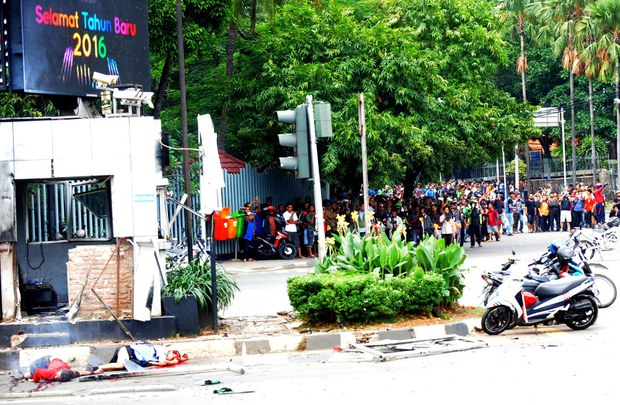More Terrorist Attacks in Indonesia ‘Likely,’ New Study Warns
2016.02.04
 Bodies lie on a street in downtown Jakarta after explosions from a terrorist attack rocked the Indonesian capital, Jan. 14, 2016.
Bodies lie on a street in downtown Jakarta after explosions from a terrorist attack rocked the Indonesian capital, Jan. 14, 2016.
Indonesia can expect more attacks by Islamic State supporters on its soil because of a rivalry among top Indonesians in the group and a split within an IS unit in Syria made up of Southeast Asian fighters, a Jakarta think-tank says in a new report.
“More terrorist attacks in Indonesia are likely as local ISIS leaders compete at home and abroad to establish their supremacy,” says the report published this week by the Institute for Policy Analysis of Conflict (IPAC), referring to IS by another acronym.
The report also divulges fresh information about last month’s deadly attack in Jakarta – the first one in Indonesia claimed by IS – saying it was plotted and executed by a home-based group called, and not orchestrated from abroad as reported earlier.
“The Jakarta attack is now known to have been locally organized – not directed from Syria as originally thought – but it almost instantly resulted in instructions from a Syria-based leader to his followers to do one better,” IPAC Director Sidney Jones said in a statement that accompanied the report’s release.
“Leaders of Indonesia’s tiny pro-ISIS camp are competing to prove their fighting credentials,” she added.
Eight people, including four men alleged to have targeted a Starbucks café and the surrounding area in downtown Jakarta with bombs and guns, died in the attack on Jan. 14.
Power play
Titled “Disunity Among Indonesian ISIS Supporters and the Risk of More Violence,” the 13-page report examines how three IS figures from Indonesia who are based in Syria have been vying for influence amongst Indonesian supporters of the group: Bahrumsyah (also known as Abu Ibrahim and Abu Muhammad al-Indonesi), Abu Jandal (also known as Salim Mubarok Attamimi) and Bahrun Naim.
According to IPAC, a rivalry between Bahrumsyah and Abu Jandal has led to the latter breaking away from Katibah Nusantara, an IS unit commanded by Bahrumsyah and made up exclusively of Malay-speaking fighters from Southeast Asia. Abu Jandal has established a faction called Katibah Masyarriq.
The report says Bahrun Naim has tried to remain neutral in the rivalry between the two but has also been “trying on his own to encourage and fund attacks in Indonesia and elsewhere in Southeast Asia.”
Contrary to what Indonesian police said in the aftermath of the Jakarta attack, when they named Bahrun Naim as its mastermind, there is no evidence to date to support that theory, IPAC reports.
It says the attack was carried out by a local group, the Partisans of the Caliphate, or Jamaah Anshar Khilafah (JAK), and whose ideological leader is imprisoned Indonesian Muslim cleric Aman Abdurrahman.
According to the report, Aman fell out with Bahrumsyah, the top IS commander in Syria, but Aman and Abu Jandal are close.
Regional implications
Bahrumsyah, Abu Jandal, and Bahrun Naim “are competing with each other to encourage their contacts in Indonesia, Malaysia and the Philippines to undertake attacks against enemies of the self-declared caliphate. In some cases, they are also providing funds,” the IPAC report says.
“At the same time, some groups in Indonesia are acting on their own, without direction from Syria, to carry out jihad operations (amaliyat) as a way of demonstrating their commitment to ISIS.”
The report goes on to say that “the competition will produce an increase in terrorist plots that regional law enforcement agencies will be hard-pressed to contain.”
The three Indonesians control different pipelines for recruiting their countrymen to join the IS cause in the Middle East, the reports suggests.
But a crackdown by Turkish authorities on suspected IS sympathizers and their families who are trying to cross into Syria will keep many IS recruits out of the war zone and confined to Indonesia, IPAC also predicts in the study.
“The fact that it has become much more difficult to cross into Syria from Turkey means that there will be more potential fighters willing to take on the war at home than in 2014 or 2015,” IPAC says, noting that more than 215 Indonesians had been deported by Turkey as of December 2015.







